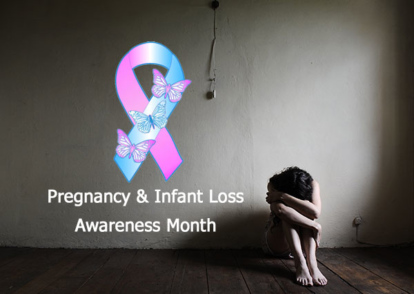by Lisa Fields
Most women who become pregnant in the U.S. today deliver healthy babies, but that’s little consolation for those who lose their babies during pregnancy or in the first weeks or months of their babies’ lives.
Up to 15 percent of women who know that they’re pregnant lose their babies to miscarriage, and about 1 percent of known pregnancies end in stillbirth.
Among newborns, 4 in 1,000 babies don’t make it through their first month of life for various reasons, such as prematurity, birth defects, illness and birth-related complications. Other babies may live longer, then die from any of these reasons or even from Sudden Infant Death Syndrome.
Parents who lose a baby during pregnancy or infancy need to grieve their loss, but their friends and relatives may not understand how deeply they’ve been affected by what has happened.
Pregnancy and Infant Loss Awareness Month was created 30 years ago to bring awareness to this important issue.
In recent years, some organizations have begun recognizing October 15th – the midpoint of Pregnancy and Infant Loss Awareness Month – as Pregnancy and Infant Loss Remembrance Day.
When then-President Ronald Reagan announced the existence of Pregnancy and Infant Loss Awareness Month in 1988, he perfectly summarized the situation: “When a child loses his parent, they are called an orphan. When a spouse loses her or his partner, they are called a widow or widower. When parents lose their child, there isn’t a word to describe them.”
All month long, and especially on October 15th, take time to learn more about pregnancy and infancy loss so that you’ll be better prepared to react if someone in your life experiences it.

Complicated feelings
When you’re pregnant, you begin to love your unborn baby, and you build up hopes and dreams for your child. And once your son or daughter is born, your feelings only intensify. When you lose your baby – either during pregnancy or after he’s born – you haven’t just lost your baby in the moment, you’ve lost the future that you were envisioning for your child, your family and yourself. These are some of the feelings that parents face while they’re grieving their loss.
Parents experience losses differently, depending on the timing of the loss. For example, some couples miscarry so early in pregnancy, they haven’t shared their baby news with family or friends yet. They may feel especially alone in their grief, because nobody knew that they were expecting. After a stillbirth, couples may dread going back home empty-handed, where they’ll be faced with a cheery nursery that’s set up to welcome a new baby to the family. If a baby dies after a long stay in the neonatal intensive care unit (NICU), parents may feel exhausted and detached from their usual lives, on top of the grief that they experience. And parents whose seemingly healthy baby dies in his sleep from SIDS may question what they could have done to prevent the terrible loss.
Parents who lose a baby during pregnancy or infancy who have other children may feel that they don’t have time to grieve because they’re too busy caring for everyone else. This can be especially true for parents of twins who lose one baby but have a surviving newborn to care for.
What to do if a friend or relative loses a baby
Many people who have lost a baby during pregnancy or infancy have said that people don’t know how to talk to them about the loss.
You may not know what to say to your friend, but saying something is better than saying nothing at all. People who are grieving need support from their close friends and relatives, so don’t disappear from your friend’s life just because you aren’t sure how to broach the topic.
You might be inclined not to talk about the baby, because you’re worried that bringing it up might make your friend sadder. The truth is, your friend will already be thinking about the loss, whether or not you bring it up. She’ll want you to acknowledge it and may need to talk to you about it.
If you aren’t sure what to say, it’s okay to tell your friend that. You just want her to know that you’re available to listen, hug or help out however you can.
What to do if you lose a baby
To say that it’s an overwhelming shock to lose your baby during pregnancy or infancy would be an understatement. Every person experiences loss and grief differently. You may scream and cry or feel dull and empty inside. Don’t let others tell you that you aren’t grieving the “right” way, that you’re either making too big a deal of the situation or not enough. Be honest about your needs and feelings, and don’t be afraid to grieve for as long as you need to. Many people benefit from meeting with a grief counselor; your doctor should be able to recommend someone.
Remember that you aren’t alone in your grief: Many other parents have lost babies during pregnancy or infancy. Some people find it helpful to join support groups, either in the real world or online. They may share their stories or seek advice from others who have experienced a similar loss. You may find it comforting to belong to such a group, because it’s a community that accepts your situation and understands what you’re going through.

Once some time passes, you may want to find ways to remember your baby. Some people find it comforting to talk about the baby by name. Others may celebrate the baby’s birthday or commemorate the anniversary of his passing. If you have any items that remind you of the baby, such as photos (including ultrasound photos) or other keepsakes, you may want to store them in a special box that you look at periodically.
Above all, let the important people in your life know how you’d like them to help you keep the memory of your baby alive. The experience may help you feel closer to each other.
DISCLAIMER:
Ameda strives to present you with accurate and useful breastfeeding information. This article may contain information and ideas that are not necessarily the views of Ameda. It does not constitute medical advice. If you have any questions please contact your healthcare professional.


